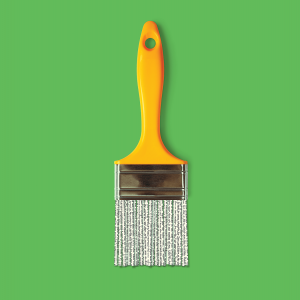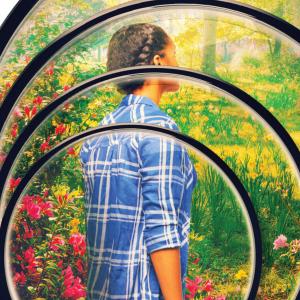
Carolina Hinojosa-Cisneros is a Tejana, Chicana, and Mujerista from San Antonio, where she is a graduate student at Our Lady of the Lake University. She is the 2019 recipient of the Rubem Alves Award in Theopoetics.
Posts By This Author
How to Move Through the Odd Reality of Now
Finding predictability in an unpredictable time.
THESE DAYS, I gather strength from predictability. Being home from work amid a global pandemic with two children—a toddler and a teenager—has filled my world with inventive ways to press on while working full-time, schooling the kids, and being a graduate student myself.
I have a newfound green thumb—working with my mini-garden, I recount stories from my childhood, stories of triumph, perseverance, and restless hope. I hope my toddler clings to these stories when things seem uncertain. I am also creating new stories to share for years to come. My journal is overflowing with COVID-19 stats, sketches of plants, and day-to-day business. It has become a place I document our lives. When my children grow old, they will look to this time and wonder how we made it through or how we handled this uncertainty because they yearn for a time when things feel hopeful again. I hope my journals will help them remember and understand how we coped with a time when we self-quarantined, socially distanced, stayed six feet apart in masks.
The Future Is Unpredictable, Yet My Houseplants Rejoice
What my grandmother's pots of rue and aloe are teaching me during the pandemic.
MY GRANDMOTHER CAME to me in a dream. It was the first day of the COVID-19 pandemic and I knew I would not be able to visit her. My daughter had just come down with pneumonia; I did not want to put my grandmother at risk. When she came to me in my dream, through the front window, covered in a thin curtain, I could see her shadow as she walked onto my porch. As I neared the door, through the window I could see that she did not knock but instead walked over to the flowers on my porch. They were a gift from her to me. She touched each one and leaned in close as if in conversation with them. She never turned to knock on my door. I woke up.
I called my grandmother to recount the dream. She told me she had hoped I was taking care of the plants. Ruda (rue), sábila (aloe vera), and Corona de Cristo (Christ plant) adorn my front porch. I’ve since added rosemary, jade, and a few others. Care of the earth has always been imperative. In our current times, survival will depend on how we treat what God created to meet our basic needs.
Proper Health Care Takes a Community—and an Act of Congress
“It takes a village” is an understatement.
MY HUSBAND AND I are privileged to have health care for ourselves and our children. While access to health care is a serious and growing concern in our nation, as well as in our own state of Texas, we realize what a privilege it is to afford, even if barely, health care through our respective employers.
Not too long ago my husband was rushed to the emergency room, and later ICU, in a near-diabetic coma. Last year, we were heartbroken over our toddler’s unexplained seizures. It took nearly four months before she was seen by a neurologist and another six weeks to be able to get an MRI. Two more months passed before we could return to the neurologist for results. For more than eight months, we had to wait on an answer, while our faith was stretched thin. When would God show up?
According to The Commonwealth Fund, Texas ranks 49th of the 50 states for worst health care in terms of access, outcomes, and costs. Texas has also opted not to expand Medicaid eligibility, which has had devastating consequences in our communities. Our elders will say that faith is what keeps them alive when the health care system has repeatedly failed them. Younger generations will say we should not have to choose between groceries, child care, and unpaid health care bills. We have been to the pediatrician, therapy, primary care, specialist, emergency room, and ICU more than we would like.
Amid Seasons of Doubt, God Keeps Creating
“While writing our resolutions, we shouldn’t forget to ask ourselves where God is in all of this, and keep creating.”
I SAT DOWN with a co-worker to talk about presence and how to make God manifest in seasons that task us with injury, depression, and even death. Seasons of impeachment hearings, 700 missing women from ICE custody, and children still detained at detention facilities begin to create sinkholes in our spirits. My co-worker likened these experiences to a leaf floating on the waters of a raging river. The leaf is carried by the current without real direction, yet the leaf endures. A season of raging rivers has taken a toll on my faith, has created holes in the fabric of my believing. Every day I ask, where is God in this?
For the last couple months, I have found it hard to articulate my feeling of suspended belief. As a poet, a writer, a lover of words, there is a tension with sharing that information in words. I’ve begun to explore other media for translating these feelings. In November, I taught myself to sculpt paper. I’m not the best at it, because I’m tempted to create words to explain these images, but I need to let the image do most of the work. There is a beauty in doubt, a beauty that makes God manifest through our hands when we can’t articulate it with our voices or our words.
What do I look like inside, in wavering belief? Where do I find God in this? God finds me working meticulously into the morning, at a loss for words, but with an X-Acto knife cutting intricate curves and penetrating delicate layers of paper to make manifest the interior of myself.
The Stories of Matriarchs Are Texts for Survival
"In my home, I am the faith gauge."
EACH WEEK IN my immigration-literature graduate seminar, we examine one book that focuses on the immigrant experience. So far, we have read about Norwegian, Italian, and Japanese experiences. Our upcoming texts center the experiences of Polish Jews, Koreans, Nigerians, Senegalese, Mexicans, and Muslims, among many others. Faith plays a central role in each book we’ve read so far, both fiction and nonfiction. In each text, the matriarch of the family brings the faith of her mother country into the United States. The matriarchs are themselves the texts for the survival of the faith in these families.
In my family, my grandmother was the compass for our faith traditions. We grew up Catholic and later became nondenominational. We explored many expressions of faith before we found one that fit. As a family, we retained many of our Catholic traditions, because they are woven into who we are. It’s a complicated relationship, and one that we greatly value.
Activism in a Time of Perpetual War
We can blame governments and unjust laws, but eventually we have to face ourselves as active participants.
America seems to be in a perpetual state of war. We’ve militarized our borders and violently separated children from their families. We are inundated with horrifying images, such as that of the father and daughter who lost their lives to the Rio Grande.
I am not from the border, but the border runs through me.
War is not new. Its effects are felt from generation to generation, a collective trauma from our ancestors to our living bodies. War lingers on the land and in our bones. We have a responsibility to speak out against destruction and to rise to meet the needs of the most vulnerable. It is clearly a time for spiritual activism.
Some churches have fallen short in speaking out. They have fallen short in meeting the needs of God’s children.
Fighting Injustice Through Self-Reflection
When theological language fails us, we must take up a form of spiritual activism.
TO LIVE A LIFE of justice, we must also live a life of constant self-reflection. My work as a writer, activist, and woman of faith informs my actions in matters of justice, which I call soul work. Yet, if I cannot examine the ways I am complicit in oppressive structures, I become part of the problem. I never want to assume that my justice work, my soul work, is not in need of introspection.
I learned about spiritual activism from reading AnaLouise Keating’s scholarship of Gloria Anzaldúa’s theopoetic work, which focuses on navigating between spaces such as home, language, the academy, gender, and spirituality, among other conceived and imagined spaces. A theopoetic work wrestles with the tension of in-between spaces when theological language fails us and we must instead take up a form of spiritual activism—advocating for our own inner healing while addressing the injustices of the world.
When Church Language Fails Us, We Resist With Poetry
As a poet, I used to compartmentalize my poetry. Christian poetry, poetry of the body, and Spanglish poetry all had their unique boxes until I came across the term theopoetics in academic scholarship. We all know how language and scholarship work. While white men are busy naming theopoetics to utilize in scholarship, women, women of color, black women, and indigenous peoples have been theopoeticizing since before Sor Juana Inés de la Cruz to the time of Macuilxochitzin.







